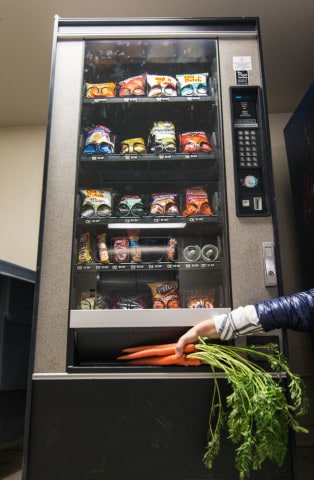SAHAR KHELIFA
We’ve all been taught to eat healthy — by our doctors, our own guilty consciences and even the computer screensavers in the university’s libraries. However, healthy choices on campus are limited and it’s time that we had healthier food vending options available.
We know fruits and vegetables are good for us and most of us wouldn’t mind living a long and healthy life but as students, our current on-campus healthy food options are minimal — and slightly unattractive.
There are, of course, already great healthy eating initiatives on campus, like the University of Saskatchewan Students’ Union’s CHEP Good Food Box program, which is good for groceries, but doesn’t exactly help students eating on the go.
The USSU’s weekly fresh food market is another great example, but while Harvey’s and A&W are open everyday of the school week, the fresh food market is not.
Vending machines are accessible all day everyday and when the semester thickens with term papers and projects, vending machines become a safe haven and much-welcomed break in the small hours of the night as we  study away. So, why not provide healthier food vending options on campus?
study away. So, why not provide healthier food vending options on campus?
Noura Sheikhalzoor, master of science candidate in nutrition at the College of Pharmacy and Nutrition and registered dietitian, says there is huge potential for healthy vending at the U of S.
“I know many students spend a long time on campus and they are looking for an option to nourish themselves. Vending machines are an option, especially after hours,” Sheikhalzoor said.
Healthy vending can provide light, healthy snacks like low-fat milk, low-fat yogurt, hummus, fresh and dried fruits and vegetables, nuts and low-sugar granola bars to students all year around.
When Sheikhalzoor came to the U of S in 2013, she worked long hours in the Thorvaldson and Health Sciences buildings. She went scouting for food only to find “chocolate bars, fatty snacks, sugary drinks and potato chips” nearby — barely tolerable foods for a health fanatic.
As a dietitian, Sheikhalzoor found this concerning and, as a hungry student lurking the hallways in search of food at night, she became frustrated. She Googled Royal Vending, the vending machine provider on campus and found they are able to provide healthier options.
A statement on their website reads: “As popular as the big brand name products are like Snickers, Doritos and Big Daddy cookies, there is an increasing demand for products that suit a more active, healthier lifestyle.”
As such, Sheikhalzoor sent Culinary Services, who are in charge of maintaining the machines, an email proposing the healthy vending machines but has not yet received an answer at the time of print.
Sheikhalzoor says the availability of healthy food vending is a win-win situation for everyone. Students and staff members would have healthier snacks and Culinary Services would make a fair amount of profit. Healthy vending might even bring in more money than traditional vending options.
“I reviewed some studies and according to research, [healthy vending] increased the sales for some campuses and schools in the United States,” she said.
Despite all the benefits of healthy vending, Sheikhalzoor notes a few challenges.
“[Healthy vending machines] might be harder to maintain because healthy options have shorter expiry dates — for example dairy products and fruits and vegetables,” she said.
However, if these options are well advertised and become popular, this may not be an issue at all as students could eat the fresher snacks before they went bad. Low maintenance food options like granola bars and dried fruit could also solve this problem.
All things considered, Sheikhalzoor says that the machines can also solve larger food and nutrition issues on campus. Healthy vending could provide healthy snacks at prices comparable to other vending machines and would be available all the time, in multiple buildings across campus, especially those buildings that are farther away from the main cafes and food courts.
—
Photo: Caitlin Taylor / Photo Editor